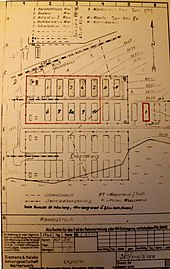Selma Velleman
Selma Velleman (born June 7, 1922 in the Netherlands ) was a prisoner in the Ravensbrück concentration camp and had to do forced labor in the Siemens camp in Ravensbrück .
Life
Selma Velleman was born in the Netherlands on June 7, 1922 and went into hiding in 1942 because of her Jewish roots, obtained a false passport and helped the Dutch Resistance rescue Jewish families by working as a courier for the Resistance. In June 1944 she was arrested in Utrecht , taken to Amsterdam prison, interrogated there and taken to the overcrowded Ravensbrück women's concentration camp .
She fell seriously ill due to mistreatment and, after recovering, reported to work in the Siemens camp in Ravensbrück . Here she was assistant of Siemens - civilian worker Seefeld. On April 23, 1945, she was freed with other Danish and Swedish concentration camp inmates as part of the White Bus rescue operation and brought to Stockholm via Denmark and Malmö .
She soon returned to the Netherlands and went to London for the War Department to work in the medical service. In the following activity in the radio department of the BBC , she completed a degree in anthropology and sociology, met her future husband, married and graduated as Selma van de Perre . She then worked as a teacher in London (Sacred Heart High School, Hammersmith)
As Selma van de Perre, she was one of the main sources for the British journalist Sarah Helm for portraying the conditions in the Ravensbrück concentration camp. Helm claims that van der Perre helped her clarify numerous questions, particularly about Siemens.
literature
- Sarah Helm: Without hair and without a name. In the Ravensbrück women's concentration camp. Theiss / WBG , Darmstadt 2016, ISBN 978-3-8062-3216-5
Web links
- Interview by Selma van de Perre (née Vellemann) in London. Werner von Siemens vocational school - project siemens @ ravensbrück , accessed on October 16, 2017 .
- https://projekt-ravensbrueck.com/ Werner-von-Siemens-Werkberufsschule - project siemens @ ravensbrück
Individual evidence
- ^ Yad Vashem : The Righteous Among The Nations .
- ↑ Sarah Helm: Without hair and without a name. In the Ravensbrück women's concentration camp . Theiss / WBG, Darmstadt 2016, p. 727 u. 750
| personal data | |
|---|---|
| SURNAME | Velleman, Selma |
| ALTERNATIVE NAMES | Perre, Selma van de (married name) |
| BRIEF DESCRIPTION | Dutch Nazi victim |
| DATE OF BIRTH | June 7, 1922 |
| PLACE OF BIRTH | Netherlands |
